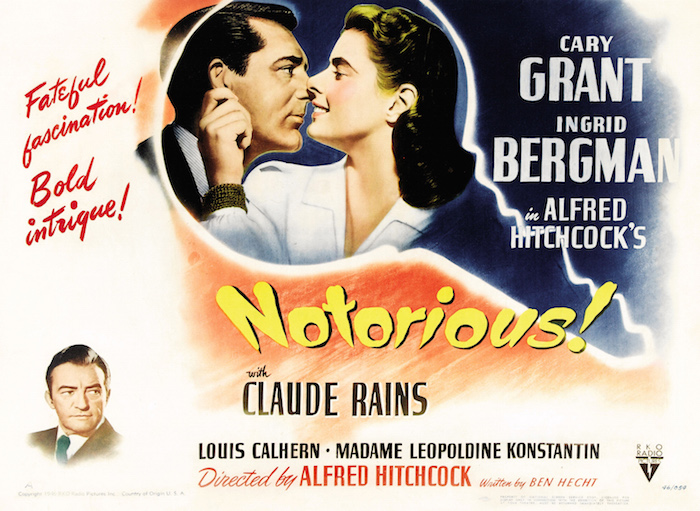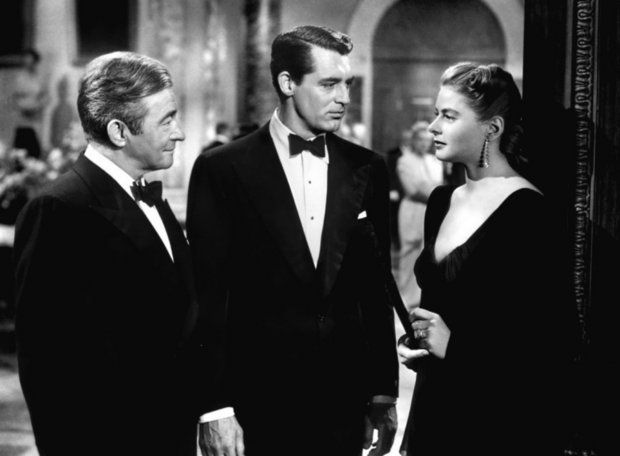Is "Notorious" Hitchcock's Only Feminist Film?
 Friday, August 21, 2015 at 7:00PM
Friday, August 21, 2015 at 7:00PM Welcome back to our Ingrid Bergman Centennial... we accidentally took a week off. Here's Deborah on Hitchcock's Notorious (1946) - Editor

Notorious is Hitchcock’s only feminist film, and Alicia Huberman, as played by Ingrid Bergman, is the only Hitchcock heroine rewarded, rather than destroyed, for her sexual agency. Notorious pairs a tramp, which is what Alicia calls herself, with a misogynist, as Cary Grant’s Devlin says he’s always been afraid of women. Alicia, then, is not fighting Nazis, she’s fighting the patriarchy and its misogynist attraction/repulsion for female sexuality.
Everyone knows that Hitchcock coined “McGuffin” to mean the thing that everyone in the film cares about, but no one in the audience cares about. The example generally used is the radioactive sand from Notorious. But I’d argue that the entire Nazi plot, in fact World War II as a whole, is the McGuffin. This is a love story, a sex story, an awakening story, and, yes, a feminist story. [More...]
Alicia’s sexuality is a source of terror for men in general, as embodied by Devlin. When we meet her, Alicia is drinking and sleeping around in reaction to the way that men have made her life unlivable: Her father, the U.S. government representatives, and the reporters who hound her are all male. She is acting all sexually empowered, but she hates herself and wants an opportunity for redemption.
Enter Devlin. Unlike every other misogynist in Hitchcock’s extensive catalog, Devlin owns his own feelings; he has always feared women, he doesn’t blame Alicia for it. Nonetheless, he hates himself for falling for her.
The acting gets very amazing very quickly. Cary Grant is capable of giving Devlin prickliness and pettiness that offsets his considerable beauty. Bergman simply melts. She is simply the most wholehearted actress to ever occupy a screen. She throws her soul into her drinking, into her smug anger at men, and into falling in love with Devlin in the movie’s most luscious scene. She melts into everything; her despair at the way she is treated, her fear as she is being poisoned, all of it. It’s like she is made of liquid, barely able to stand on two feet as emotions fill her.
But we’re not done with the feminism, because now Alicia has to use her sexuality to fight Nazis, causing THE ENTIRE PATRIARCHY to feel very ambivalent indeed. In a pivotal scene, government stuffed shirts discuss Alicia’s work. They know that what Alicia is doing is loathsome and dangerous—and therefore heroic--yet they are disgusted with her for doing it. It’s not spying on Nazis that makes her an ambivalent figure, it’s using her sexuality to do so, and by extension, it’s being sexual. Devlin suddenly sees the hypocrisy and calls out the others. He praises Alicia for who and what she is. In that moment, he is not measuring her by whether or not she sleeps around, only by her honor and courage. When he first falls in love with Alicia, Devlin wants to tame her, but from here on out, he loves her for who she is, sexual agency and all.

Meanwhile, Alicia is being poisoned. The McGuffin reading is that it’s a murderous Nazi plot, but poison serves multiple symbolic purposes: Both as the fate of a “tramp” and as a parallel to the self-inflicted poison of her alcoholism. (There are first half/latter half parallels throughout Notorious that this essay has no room to discuss.)
It’s possible to read it all as anti-feminist: Alicia hates her own sexuality and uses it to punish herself, and is saved by the love of a good man. Blah. I don’t think so, though. The thing Alicia seems to hate the most is being looked at and judged. We first see her in Notorious being questioned and photographed by reporters; she wants to get away. Then she wants to get away from cops, then from people who spy on her. It’s always when she is being looked at and judged that she drinks. The judgmental gaze of the patriarchy is what poisons her, and when Devlin at last accepts her, she can be healed.




Reader Comments (10)
Nice post, but I'd suggest if you think Notorious is his only feminist film, you might be due for a rewatch of some of his other films. I actually think his most feminist film is 'Spellbound', also with Bergman, in which a career-minded woman is condescended to on all sides - by her boss, her colleagues, the men who want to nail her, even her mentor - but who nonetheless sticks to her guns and trusts her analytical abilities, even when the villain is calling her a 'rather stupid woman'. She even talks herself out of certain death at the end.
"Rear Window." Read Tania Modleski's seminal essay on it and you'll be convinced.
Also there's Eva Marie Saint in North by Northwest. She is not punished either for her sexual agency. In fact, she gets her man at the end.
I agree with earlier posts - Hitchcock has made many films where a female has been portrayed equally as men.
I thought Eva Marie Saint in the glorious North by Northwest is the equal to Cary Grant - just ignore the Hollywood forced ending.
There's Gaslight, Spellbound etc.
Interesting reading of the film...
It's true: when I think of Notorious, the plot is the last thing that comes to mind. It's the twisted love story and the poisoning.
As others have said above, Rear Window is definitely another Hitchcock feminist film. I wrote an essay on this exact topic in college, discussing how Grace Kelly's character is actually the hero in that film and beyond being beautiful, does not adhere to many of the expected stereotypes of women in film, especially during that time period.
Perhaps give that one a re-watch?
Grant was really excellent played agst type as the cold & heartless scum, who realised his folly at the 11th hour & Bergman, ditching her Saint Ingrid's halo, gave a fully realised of a real, sexual woman who is willing to sacrifice everything for luv...
Its a shame tt's not much Oscar luv for Notorious (only 2 nom & no nom for Grant or Bergman!!!), as compared to the numerous nom bestowed on Spellbound the previous yr. If I've to choose, surely Notorious is the superior of the two...
IMO, Bergman shld've won her 1st Oscar for this rather than Gaslight, freeing out the win to a more deserved Stanwyck in Double Indemnity
I disagree about Spellbound, as I think it adheres to a very old-fashioned portrayal of "career women" as frigid, unable to get a man, and softened away from career by love. However, the reading of Rear Window in that light is really interested.
I disagree about Rear Window. I think Grace was just slightly more than a beautiful sexy object in it. Notorious has the best lead actress and supporting actor performance from any Hitch film. Ingrid is so good in this and she made the two male leads (fantastically played by Grant and Rains) reactionary to her action. Not my favorite Hitch film which is Vertigo. But this is nonetheless a perfect film.
I would reward Bergman best actress for Notorious, Journey to Italy/Fear (1954) and Autumn Sonata. You can argue that she could win for Casablanca/For whom the bell tolls, Europa 51 (1952) and Anastasia.
She gave great performance in made for TV movies such as turn of the screw and Human voice. Throughout her career, she did lots of stage work that were highly regarded. I would like to pay big price to see her work in Joan of Lorraine.